WASHINGTON, Sept. 8, 2011 — As NATO’s Training Mission Afghanistan works to build the country’s army, air force, and police, it is doing so with an emphasis on being “Afghan centric,” the mission’s deputy commander said.
U.S. Army Maj. Gen. Peter Fuller discussed NATO’s mission to train a self-sufficient Afghan military and police force yesterday on a DoDLive Bloggers’ Roundtable.
The general said it is unrealistic to think a few years of training will create a military “on par with our own,” and an Afghan military won’t have the same requirements as the U.S. military. He said he tries to focus on what an Afghan army, air force or police force might need.
“The three words I use around here a lot are, we’re trying to be Afghan-right, we’re trying to be Afghan-first, and now, we’re trying to be Afghan-like,” Fuller said.
For example, he explained, the U.S. Army has mobile kitchens they can set up until a contractor can get on-site to provide food for the troops. But the Afghan army tends to be more localized, he said, and doesn’t need a lot of expeditionary capability.
Building infrastructure also has shown the Afghan military to have differing requirements. Western building standards dictate certain amenities, including air conditioning, propane-equipped kitchens and Western-style toilets. Afghans have different “necessities.”
Bathrooms at U.S. installations in Afghanistan had porcelain sinks � a western standard. “But the Afghans like to wash their feet before they do prayers,” Fuller said. “So they were trying to perch on the edge of a porcelain sink, and it didn’t work out very well. So, now we’ve changed it to Afghan-right.”
Doing what’s right for Afghanistan can come through business partnerships, too. NTM‑A is working with Afghan-owned and operated companies to build a sustainable military support industry, the general said.
The 352,000 members of the Afghan National Security force need boots, uniforms and other equipment, Fuller said, and there’s no reason to import them.
“We’re having an Afghan company — or actually, several Afghan companies — make the uniforms, make the boots, make all the equipment items that they need,” he said. “Now we’re getting a much lower price because the price we had to pay for in the United States was one that had a shipping cost associated with it.”
Fuller said he wants NTM‑A to leave Afghanistan with a capable, sustainable security force, and a market for locally produced equipment to help their economy grow and develop.
“We’re trying to do several things … : build what’s appropriate for Afghanistan, use Afghanistan companies as much as possible, and then ensure that as they establish standards for accountability and stewardship, that they follow them,” Fuller said.
Source:
U.S. Department of Defense
Office of the Assistant Secretary of Defense (Public Affairs)

 von
von 